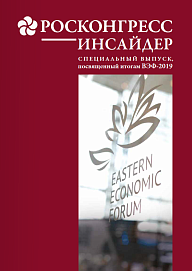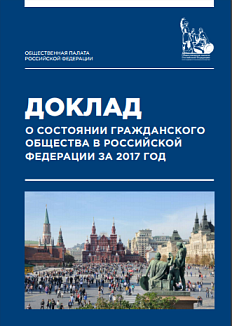The Far East — Development Horizons
The Roscongress Foundation experts note that five years of consistent efforts on the part of the government to stimulate the region’s economy have produced notable results that will help to kickstart a new stage in its development. This is why in 2019, the Eastern Economic Forum (EEF) was held under the motto ‘The Far East — Development Horizons’. In this issue of Roscongress Insider, the tasks and the solutions related to the development of the Far East are grouped into three sections: economic, international, and social.
Broadening Horizons of the Economy
The participants of the Eastern Economic Forum 2019 acknowledged that business support measures created in the Far East were popular among investors. As a result of the work over the last five years, over 240 operations are now up and running, 39,000 jobs have been created, and over RUB 600 billion of private investment has been attracted. The region now attracts 10 roubles of private investment per rouble allocated from the budget for infrastructure. As many as 20 territories of priority social and economic development have been established around the region, while the 369 resident companies registered there have signed contracts worth nearly 2.5 trillion roubles.
The attendees of EEF 2019 identified the following steps that could help stimulate economic growth: developing infrastructure (including R&D infrastructure), developing science and technologies, improving legislation, reducing administrative pressure on businesses, etc. The experts acknowledged that to complete these tasks, the region must provide stable environment for investors, continue to adjust the mechanisms for attracting investors and supporting entrepreneurship, improve business climate at federal and regional levels. Among other development instruments, the experts singled out introducing digital technologies into administration and business activities and developing eco-tourism.
Broadening Horizons of International Cooperation
Broadening international cooperation is one of the priorities of the Far East. The location of the Far Eastern Federal District and its proximity to the Asia-Pacific nations offers unique development opportunities for the region and helps to attract foreign investment. Notably, the prime ministers of India and Japan who spoke at the Forum, mentioned that their countries were interested in the Far Eastern region. The Forum participants affirmed that utilizing the potential of transport projects was another important task. The region’s lag in socioeconomic development is a huge challenge for cooperation. Narrow internal market, underdeveloped infrastructure, and a lack of qualified human resources prevent foreign companies from arriving to the region’s market. Foreign guests of the Forum spoke in favor of signing free trade agreements between Mongolia and the EAEU and between ASEAN and the EAEU. Creating special zones in border regions was identified as another mechanism for invigorating trade. Forum participants emphasized the need for the Far Eastern Federal District to become part of global value-added chains in the Asia-Pacific region.
Broadening Horizons of Life
Creating favourable conditions for life was identified as a prerequisite for the development of the Far East. By 2021, as part of the project to facilitate the social development of cities [centres] of economic growth, the federal budget will allocate RUB 95 billion to construct, repair and upgrade over 700 social facilities.
Despite all these efforts, the region’s social development currently lags behind the national average. This is because a number of problems in healthcare, housing, urban environment, education, and culture remain unsolved. The problem of dissatisfaction with living conditions still exists, though it has halved since 2005. The President of the Russian Federation has given orders to prepare a national programme for the development of Russia’s Far East to 2025 and further to 2035. The programme aims to overcome the region’s socioeconomic lag. A new mortgage programme that is set to launch in 2019 and run for five years should become an effective tool in resolving the housing problem. In healthcare, the approach to financing must be altered, and some measures to attract social workers to the Far East must be taken. Also, it is possible to launch breakthrough projects in healthcare, for example create a medical cluster with a special regulatory procedure. The human resources situation can be improved by increasing the intake of students at Far Eastern universities, reintroducing a distribution scheme for graduates, and creating a network of education facilities to support the industry at both undergraduate and graduate institutions.






